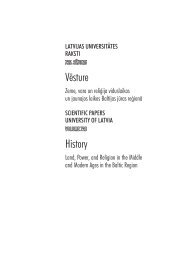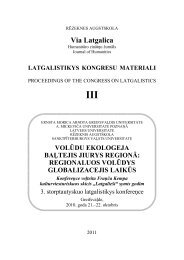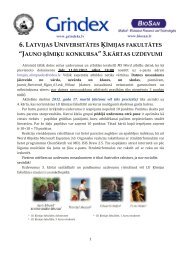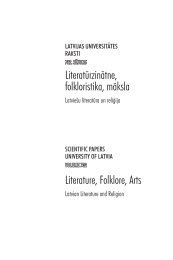Untitled
Untitled
Untitled
Create successful ePaper yourself
Turn your PDF publications into a flip-book with our unique Google optimized e-Paper software.
200 LITERATÛRZINÂTNE, FOLKLORISTIKA, MÂKSLA<br />
The Regency Crisis, which forms an important historical background for Persuasion,<br />
caused much confusion and heated debates on the question that should rule the country.<br />
In 1811, the illness of King George III led to a serious constitutional crisis in Britain.<br />
Already in 1788, the King had suffered a serious bout of insanity, which 23 years later<br />
resulted in his permanent incapacity. Fears about the security and stability of the country<br />
were also increased by the events across the English Channel, which became even more<br />
threatening in the light of the domestic troubles. The weakness of the state could have<br />
encouraged foreign invasion at any time. The ailing King and the Regent, the future<br />
George IV, were unable to guarantee the stability and order the kingdom needed.<br />
In connection with all–out dissatisfaction with the Prince Regent’s policy, the<br />
question of efficient management of a country estate arose. It became very characteristic<br />
of the period to draw parallels between the government of the state and an estate<br />
or a house. 1 The estate was seen offering commentaries on the government of the state<br />
and vice versa. According to Anne Elliot in Persuasion, each house is a “little social<br />
commonwealth” on its own where the welfare and happiness of its inhabitants depend<br />
on the management of the estate. 2 The country estate was like a small state to be<br />
governed according to similar principles as the state itself. In Persuasion, Kellynch<br />
Hall is a country estate on the verge of troubles caused by its inner weakness like the<br />
state itself during the Regency Crisis.<br />
The reasons for raising the issue of patrilineal descent in the novel lie in this uncertain<br />
and precarious period of British history. The problem of succession in Persuasion<br />
seems to be tightly connected with the political situation in England at that time. According<br />
to the laws of succession, the Prince of Wales, the King’s eldest son should have<br />
become the Regent. Prince George, however, had marred his reputation and title with<br />
gambling, marital chaos, debts and reckless extravagance which was anything but expected<br />
from the future king. The Prince’s unsuitability to rule the country led to various<br />
disputes on the efficiency of the laws of succession. The inflexibility of the laws that had<br />
been valid since the Middle Ages offered no alternative in situations like this. Even the<br />
Tories who had always supported more conservative approach raised the question of<br />
female rule for the state itself in an attempt to prevent the Prince of Wales from gaining<br />
control of his father’s political house. 3 The debates on the Regency Crisis included the<br />
subject of investing Queen Charlotte with some of the Regent’s powers. Though such<br />
innovative ideas did not find enough support in general, the question of the patrilineal<br />
descent was brought up. In Persuasion, this social aspect is vividly reflected in the problem<br />
of who should inherit Kellynch Hall, the estate of the Elliots. Sir Walter Elliot, a<br />
widower and the owner of the estate, has three adult daughters who cannot inherit the<br />
estate because of the exclusion of female descendants from the line of succession according<br />
to the convention of patrilineal descent.<br />
The system of inheritance current at that time had many drawbacks because of its<br />
strict adherence to the conventions. For the inheritance of the title as well as of the land,<br />
estate and family heirlooms, definite laws had been evolved. As the continuity of a house<br />
was valued very highly, the laws of succession established several aspects that were in<br />
service of this aristocratic principle. The most important institutions concerning inheritance<br />
were inalienability and entail that “settled the succession of an estate inalienably<br />
upon the descendants of an individual owner”. 4 The aspect of primogeniture whereby<br />
the preference in inheritance was given to the eldest son was an essential complement to

















